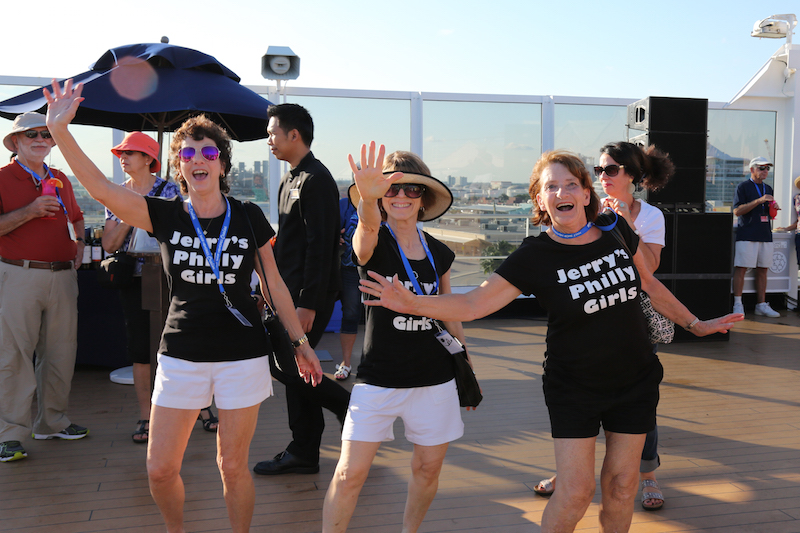A Word with the one and only Jerry Blavat
For Jerry Blavat, it’s all about neighborhood, family, connection, dreams, and — of course — the music.
“We grew up in America when you knew your neighbor,” says Jerry. “We were young and music was our friend. Music spoke for the things that we felt.”
By way of example, he tells of a common occurrence from his many years in radio. “I’d be on the air and there’s a kid who went to [one of my] dances. I’m playing the music, and he’s dancing with a girl for the first time. And they listened to the radio.”
“He would call me up and say, ‘This is Ed.’”
(That’s the essence of Jerry: bringing someone he’s just met into the conversation, connecting with him.)
“‘Hey Ed, how are you? You were great last night dancing.’”
“He’d say, ‘You saw me dancing with Sue?’”
“‘Yeah, I saw you dancing with Sue. Make a dedication. What do you want to play for her?’”
“And he’d say, ‘You play a song and that will be our song.’”
“Fine.”
“‘Sue, this is from Ed:’ ‘I Only Have Eyes For You.’”
“Then she would call me.”
“‘Geator, please play something for Ed.’ ‘You got it!’”
“Now that became their song because the lyrics spoke for the things he felt for her and that she felt for him. Music talks to the things that we experience.”
Growing up in South Philadelphia, Jerry’s childhood experiences were hardly those of the Father Knows Best-type of family seen on TV.
“I came from a broken family. I lived at my grandmother’s house. At night we would go to the bookie house. Then go to sleep, get up in the morning at five or six o’clock. My mother was a riveter during the Second World War. Ship us off to day nursery school. Pick us up [and] stay at my grandmother’s until we went home.” The neighbors, the older people, became Jerry’s second family.
“Look,” Jerry continues. “I’m half Italian, half Jewish. I remember seeing all the Jewish wise guys, dressed to the ’T,’ going into the bar, where I saw them drinking scotch and bourbon, smoking cigarettes. I learned from the older Jewish guys in the record business. I love the Italians but I wanted to have that class that those Jewish people had.”
His first steps toward achieving that dream were “as a kid dancer, at 13 years of age in 1953, on a local show called Bob Horn’s Bandstand. You had to be 14 but I snuck in. I won a jitterbug contest, got fan mail. I won another jitterbug contest. By the time they found out I wasn’t 14, there was nothing they could do. The host said to me, ‘You’re one of the most popular kids on the show. No more getting into dance contests, but [we’ll make] you the head of the dance committee.’”
“My other duties were picking the music and making sure that when the show went live, I would greet the guests and make sure that when Bob Horn said, ‘We’ve got company,’ they would hit their mark on the floor.”
He met the big stars of the day: Tony Bennett, The Four Aces, Joni James, and one in particular who became a friend for life. “One day I’m jitterbugging and I got off the floor to get this little guy [to hit his mark]. And before I can say [anything], the guy says, ‘Man, where did you learn to dance like that?’”
“I said, ‘Everybody in South Philly dances. We try and impress the girls.’ And he laughed and said, ‘Well, you’re like a little white me.’ I looked at him…in like 1954/55…and it was Sammy Davis, Jr. And we became dear friends.”
That was just the beginning. When Bob Horn got into some drunk driving trouble and was replaced by Dick Clark, Jerry stayed loyal to his self-admitted “second father” (although he later became fast friends with Dick).
Through his dancing skills, his uncanny knack for picking the next hit record, and the connections he made with those in the record and show business, Jerry branched out.
“I became Don Rickles’ valet. I’d drive him around. You’re talking 1957.”
“There was a group called Danny & The Juniors and I became their road manager. We would go on one-nighters on a bus with Paul Anka, with The Everly Brothers, with The Poni Tails, with Connie Francis. So I lived with these people.”
“When I started doing teenage dances when I was 18 years of age, all the kids in the neighborhood came [because] they knew me as a dancer from Bandstand. Back then I did dances with 200 kids. But when I went on the radio in 1960, I did dances with 2000 kids from every part of the Delaware Valley, not just from South Philly.”
His first radio gig was an “accident,” where an opportunity appeared and Jerry seized it. “I was doing a talk show from the Venus Lounge. My guests were whoever came into town. Whoever worked on the road, (many of them performers whom Jerry knew from his other activities) when they were in Philly, they would do my radio show.”
“One day a snowstorm closed the club and since I owned the time [on the station], I took my rock ’n’ roll records up there and I started to play this music.” He spun his favorite singles through the night and by dawn of the next day, Jerry was a radio deejay: a title he qualifies thusly: “I have never considered myself to be a disc jockey: I am a performer. I entertain people. I don’t just stay behind a microphone.”
Anyone who has seen Jerry in action — at his dances, in his club, or on his TV show — can attest to that. Jerry is a one man gang of Energizer bunnies: dancing, singing, talking jive. “You know what keeps me going?” he asks. “The audience, the smiles, the embraces. The happiness that, by the grace of God, I am able to give to them. I know where these people come from. We’ve lived it together.”
“This is the story of the Malt Shop Memories cruises. If someone is there for the first time, they meet new people and they become part of a family. We grew up in a wonderful time in America when it was family neighborhoods. Now our neighborhoods are all over the world because of the music.”
“It’s been an amazing run and I never planned on being where I am today. I’ve always let the music and the spirit and whatever God has given me, take me where I am. I just did what I wanted to do and only by the grace of God am I still here.”
“I was [just] a little kid in America who came from a broken family, a neighborhood kid who never ever stopped following his dream and his passion: music and making people happy.”
“As a lonely kid, watching the other kids outside playing during the summertime, and I’m looking out the window…music kept me whole.”
He pauses, then laughs and adds, “And dancing, from the Italian side.”
Ed Osborne © 2016

